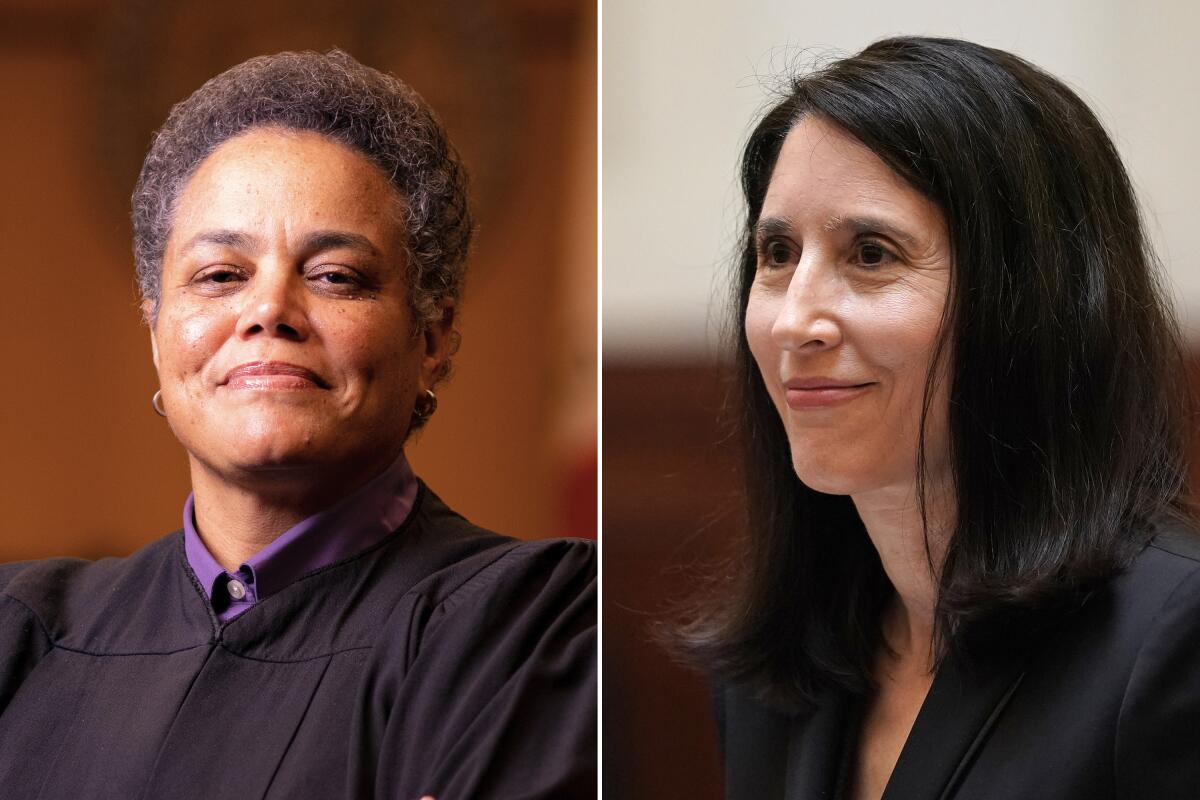Newsom’s two appointees to California Supreme Court win approval, making history

- Share via
Gov. Gavin Newsom’s two recent picks for the California Supreme Court made history this week, winning a key confirmation and voter approval to become the high court’s first openly lesbian justice and first Latina chief.
Newsom nominated Associate Justice Patricia Guerrero to serve as the court’s next chief justice in August, after current Chief Justice Tani Cantil-Sakauye announced that she would not be seeking a second term.
Voters approved Guerrero’s appointment in Tuesday’s midterm election. With about half the state’s ballots counted as of Thursday, more than 70% of voters were in favor of her appointment.
Guerrero declined to comment.
Also Thursday, Alameda County Superior Court Judge Kelli Evans won unanimous confirmation from the state’s Commission on Judicial Appointments to take over Guerrero’s associate justice seat.
Newsom announced his selection of Evans in August as well. Evans lives with her wife, Terri Shaw, in Oakland. Shaw and the couple’s college-age daughter, Kaden, were in attendance for Evans’ confirmation hearing along with an array of Evans’ other family members, who beamed with pride during the hourlong proceeding in San Francisco.
Both women will take their seats in January, when Cantil-Sakauye’s term ends. Cantil-Sakauye is joining the Public Policy Institute of California as its next president and chief executive.
Three other sitting associate justices who went before voters Tuesday — Joshua P. Groban, Martin J. Jenkins and Goodwin Liu — also will remain on the court, with about 69% of voters supporting each as of Thursday.
Jenkins, the court’s first openly gay justice, was also appointed by Newsom. Liu and Groban were appointed by Gov. Jerry Brown. Jenkins and Liu attended Evans’ hearing, as did Guerrero.
The state’s Commission on Judicial Nominees Evaluation, which assesses the qualifications of proposed justices, found Guerrero to be “exceptionally well qualified” to take over as chief during her confirmation hearing in August.
On Thursday, the same review board found Evans to be “well qualified” to serve as an associate justice, meaning it found she “possesses qualities and attributes indicative of a superior fitness to perform the appellate judicial function with a high degree of skill, effectiveness, and distinction.”
Cantil-Sakauye and the two other members of the judicial appointments commission — California Atty. Gen. Rob Bonta and presiding California Court of Appeals Justice Manuel Ramirez — said they had no reservations about confirming Evans. Three of her friends and former colleagues who spoke at the hearing as witnesses to her qualifications and character heaped praise on her.
They described Evans as a hard worker, a consensus builder and someone who is dedicated to fairness and equality. All three praised her strong moral character.
Before being appointed to the Alameda bench by Newsom, Evans served as Newsom’s chief deputy legal affairs secretary and worked stints at the California Department of Justice, in the Civil Rights Division of the U.S. Justice Department, as an assistant public defender in Sacramento and as associate director of the American Civil Liberties Union of Northern California. She has also served on federal teams that monitored troubled police departments. She attended UC Davis School of Law.
Evans, who is Black, was raised in public housing in Denver by her late grandmother, Alfreda Onita Cooper. On Thursday, she credited Cooper not only for her success but that of the other women in her family at the hearing.
“We’re more than her wildest dreams. We’re actually the direct manifestation of her deliberate, intentional actions to make sure that we had opportunities that she was denied, that so many people were denied,” Evans said. “So this day belongs to her as well.”
Evans said she looked forward to working collaboratively with the high court’s six other justices to ensure the law is applied fairly to all Californians.
“I believe that my grandmother would have understood, as I do, that the law is not simply — and it’s so much more than — an esoteric, ivory tower exercise,” Evans said. “At its core, what is the law about? It’s about real people and real communities.”
More to Read
Sign up for Essential California
The most important California stories and recommendations in your inbox every morning.
You may occasionally receive promotional content from the Los Angeles Times.














